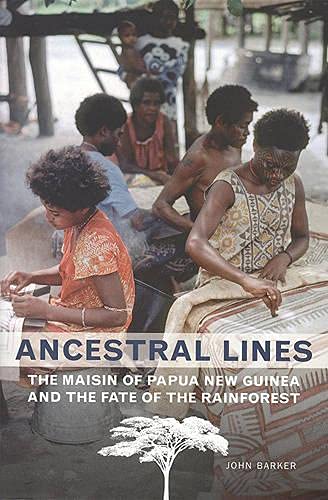Ancestral Lines: The Maisin of Papua New Guinea and the Fate of the Rainforest (Teaching Culture: UTP Ethnographies for the Classroom)


sku: COM9781442601055USED
ACCORDING TO OUR RECORDS THIS PRODUCT IS NOT AVAILABLE NOW
$5.13
Shipping from: Canada
Description
More than a century of interaction with colonial and global agencies and forces have brought many changes to the lives of the Maisin people who live on the northeastern coast of Papua New Guinea. Yet ancestral traditions continue to strongly inform their way of life. Their beautifully designed tapa cloth, made from the pounded inner bark of the paper mulberry tree, most vividly connects the past with the present. Using the various stages of tapa cloth production to frame a broader discussion of changes and continuities in Maisin culture (economic pursuit, social arrangements, gender relations, religion, politics, and the environment) Barker offers a nuanced understanding of how the Maisin came to reject commercial logging on their traditional lands. Viewed in isolation, the decision appears to be a confirmation of tradition over "modernity." Yet the book shows that it is the most recent, and perhaps dramatic, instance in a long chain of improvisations and compromises that have allowed the Maisin to remain true to core ancestral values while participating in wider social, political, and economic systems. Ancestral Lines provides an important counterpoint to the stereotype of indigenous peoples as passive victims of impersonal global forces. While accessible to most readers, including those with little or no knowledge of Melanesia or anthropology, Ancestral Lines has been designed with introductory anthropology courses in mind. Each chapter opens with a description of succeeding stages in the creation and use of a piece of tapa cloth. These, in turn, lead into discussions of dimensions of Maisin life that correspond to the sections and order of most standard introductory textbooks.
Price history chart & currency exchange rate
Customers also viewed

$41.70
24 шт. винтажная посуда, набор столовых приборов, обеденный нож, вилка, ложка, набор столовых приборов, роскошная посуда в западном стиле с гравировкой, набор стеллажей 24Pcs-Silver
joom.com
$17.03
Удлинитель подножки для мотоцикла из алюминиевого сплава - удлинитель боковой подставки, опорная пластина для принадлежностей для мотоцикла чёрный
joom.com
$37.22
YOUNITE YOUNI-ON ФОТОКНИГА ВЕРСИЯ. 3-й EP-альбом + бесплатный подарок Random,No poster
joom.com
$16.85
Галстук-бабочка мужской свадебный жених шафер корейский костюм бордовый красный мужской галстук-бабочка прилив
joom.com
$21.78
Maccabi Netanya FC Women & Men Crossbody Sling Backpack Shoulder Sling Chest Bag Travel Hiking Daypack
aliexpress.com
$15.02
Fuel Tank Bag For KOVE Cobra 321R 500X For Colove KY500X Macbor Montana XR5 Motorcycle Waterproof Racing Bags Tanklock
aliexpress.com
$72.67
2M253J Samsung Magnetron OM75S-71-ESMN left and right 6 holes suitable for Midea microwave oven
aliexpress.com
$4.41
Women's Hoodie Autumn and Winter New Cute Kawaii Sanrio Hello Kitty Pattern Sweatshirt 2024 Streetwear Women's Clothing
aliexpress.com
$19.18
happy Grizzy and Lemmings cartoon T-Shirt vintage clothes oversizeds Blouse korean fashion mens t shirts
aliexpress.com
$11.70
New Origami Animals T-Shirt hippie clothes cute tops sweat shirt black t-shirts for men
aliexpress.com
$54.45
Wood Carving Tree Small Ornament Cute Office Home Study Desktop Display Decompression Ornament
aliexpress.com
$19.13
DCB200 For Dewalt Battery 60V 9000mAh MAX Battery DCB606 DCB609 DCB205 DCB206 DCB209 DCB182 9.0Ah/6.0Ah Power Tool Battery
aliexpress.com
$16.72
40KG servo waterproof DS3240 high Torque Digital 180/270 Degree full Metal Gear Baja Servo for 1/8 1/10 Scale RC Crawler Car DIY
aliexpress.com
$19.48
925 Sterling Silver Exquisite Design Activity Three Diamond Jewelry Bracelet, Fashionable And Exquisite Gift
aliexpress.com
$8.99
Браслет из металла/натуральной кожи р.19-20 Мастерская Алёшиных И01.45.00.04, И01.45.00.04
goods.ru
$69.51
Профессиональное удаление вмятин на металлической поверхности для удаления вмятин при граде автомобиля
aliexpress.ru
$101.06
3 Ton Pneumatic Jack Cushion Pneumatic Lifting Jack Inflatable Roller Pneumatic Jack Inflatable Lifting Height Jack New
aliexpress.com
$19.77
Retro Geometric Gradient Design 839 Sleeveless Dress Women's summer suit Dress vintage women's summer jumpsuit
aliexpress.com
$2.00
Motorcycle LED Turn Signal Light Blinker Side Indicator lights For 390 125 200 1290 exc 450 250 300 125 1190 adventure
aliexpress.ru
$32.57
women's wallet women's long zipper tassel wallet new fashion simple korean large-capacity clutch mobile phone bag
fordeal.com
$34.30
girl's dresses fashion princess dress summer baby girls lace kids girl birthday party clothes gift toddlers wear 2021 spring, Red;yellow
dhgate.com
$46.74
For GoPro Hero 9 Battery Charger 1750mAh Li-ion Batteries For Go Pro Hero 9 AHDBT-901 Li-ion Batterie
aliexpress.com










